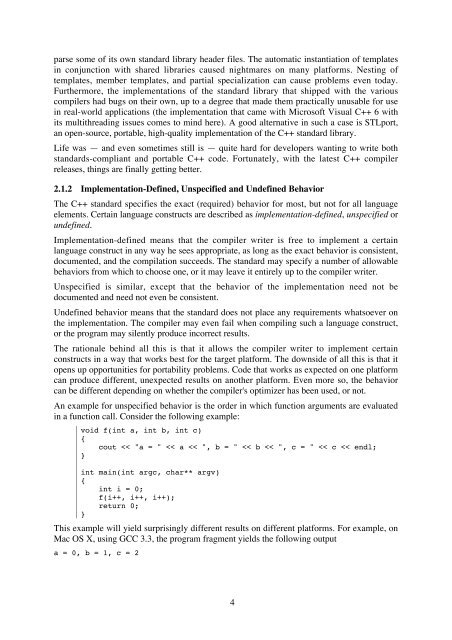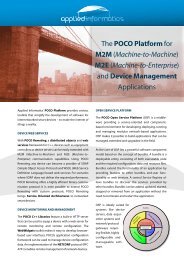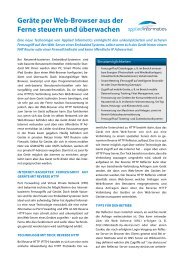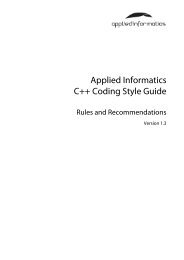Designing and Building Portable Systems in C++ - Applied Informatics
Designing and Building Portable Systems in C++ - Applied Informatics
Designing and Building Portable Systems in C++ - Applied Informatics
Create successful ePaper yourself
Turn your PDF publications into a flip-book with our unique Google optimized e-Paper software.
parse some of its own st<strong>and</strong>ard library header files. The automatic <strong>in</strong>stantiation of templates<br />
<strong>in</strong> conjunction with shared libraries caused nightmares on many platforms. Nest<strong>in</strong>g of<br />
templates, member templates, <strong>and</strong> partial specialization can cause problems even today.<br />
Furthermore, the implementations of the st<strong>and</strong>ard library that shipped with the various<br />
compilers had bugs on their own, up to a degree that made them practically unusable for use<br />
<strong>in</strong> real-world applications (the implementation that came with Microsoft Visual <strong>C++</strong> 6 with<br />
its multithread<strong>in</strong>g issues comes to m<strong>in</strong>d here). A good alternative <strong>in</strong> such a case is STLport,<br />
an open-source, portable, high-quality implementation of the <strong>C++</strong> st<strong>and</strong>ard library.<br />
Life was — <strong>and</strong> even sometimes still is — quite hard for developers want<strong>in</strong>g to write both<br />
st<strong>and</strong>ards-compliant <strong>and</strong> portable <strong>C++</strong> code. Fortunately, with the latest <strong>C++</strong> compiler<br />
releases, th<strong>in</strong>gs are f<strong>in</strong>ally gett<strong>in</strong>g better.<br />
2.1.2 Implementation-Def<strong>in</strong>ed, Unspecified <strong>and</strong> Undef<strong>in</strong>ed Behavior<br />
The <strong>C++</strong> st<strong>and</strong>ard specifies the exact (required) behavior for most, but not for all language<br />
elements. Certa<strong>in</strong> language constructs are described as implementation-def<strong>in</strong>ed, unspecified or<br />
undef<strong>in</strong>ed.<br />
Implementation-def<strong>in</strong>ed means that the compiler writer is free to implement a certa<strong>in</strong><br />
language construct <strong>in</strong> any way he sees appropriate, as long as the exact behavior is consistent,<br />
documented, <strong>and</strong> the compilation succeeds. The st<strong>and</strong>ard may specify a number of allowable<br />
behaviors from which to choose one, or it may leave it entirely up to the compiler writer.<br />
Unspecified is similar, except that the behavior of the implementation need not be<br />
documented <strong>and</strong> need not even be consistent.<br />
Undef<strong>in</strong>ed behavior means that the st<strong>and</strong>ard does not place any requirements whatsoever on<br />
the implementation. The compiler may even fail when compil<strong>in</strong>g such a language construct,<br />
or the program may silently produce <strong>in</strong>correct results.<br />
The rationale beh<strong>in</strong>d all this is that it allows the compiler writer to implement certa<strong>in</strong><br />
constructs <strong>in</strong> a way that works best for the target platform. The downside of all this is that it<br />
opens up opportunities for portability problems. Code that works as expected on one platform<br />
can produce different, unexpected results on another platform. Even more so, the behavior<br />
can be different depend<strong>in</strong>g on whether the compiler's optimizer has been used, or not.<br />
An example for unspecified behavior is the order <strong>in</strong> which function arguments are evaluated<br />
<strong>in</strong> a function call. Consider the follow<strong>in</strong>g example:<br />
void f(<strong>in</strong>t a, <strong>in</strong>t b, <strong>in</strong>t c)<br />
{<br />
cout








